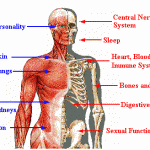Alcohol affects all organs and systems of the body. Depending on genetic predisposition and co-existing diseases the patient may develop one or more disorders from:
Nervous system
Cardiovascular system
Liver
Digestive system
Other organs and systems
After 10-15 years of alcohol abuse all mentioned disorders become irreversible.
Female alcoholics who continue drinking during pregnancy run the risk to give birth to so-called alcoholic fetus with the rough morphological defects such as abnormal head size and altered ratio of the body; spherical and deeply set eyes, broad nose, recessed base of the nose, maxillary hypoplasia, shortened tubular bones.
Personality changes.
The prominent Russian psychiatrist of the 19th century A. Korsakov wrote that the alcoholic is ready to blame everybody and everything in his problem, but not himself.
The 1st stage of alcohol addiction lasts from 1 to 5 years. Alcoholism due to chronic toxic effects of alcohol on the central nervous system alters man’s personality and brings in the new characteristics previously not peculiar to him. The new unfavorable features emerge and gradually turn into sustained behavioral patterns. The longer period of alcohol abuse, the greater changes in personality. Negative features roughen so quickly that a person becomes a bleak copy of himself already after 3-5 years of alcohol abuse. New traits in character and behavior pattern include frequent mood swings, lack of self-confidence, roughness, falsehood, impudence, vainglory, irritability,increased tiredness. Moral and ethical standards decline.
The 2nd stage of alcoholism lasts 5-10 years. The most significant signs of this stage are: noticeable decline in personality, loss of creativity and former interests. A person loses interest in everything that is not associated with alcohol. Lack of criticism, callousness, declined moral criteria become common. Jokes become “flat”, rude, cynical and inappropriate. Social status and professional skills deteriorate drastically. The person persistently seeks and finds any extenuating circumstances letting him to continue with alcohol abuse. As a rule, he still strongly denies that he has the problem with alcohol at this stage.
The 3rd (the final) stage of alcoholism lasts 10-20 years. During that period the symptoms of severe brain damage become outspoken. Long term brain intoxication results in severe impaired memory and diminished intelligence. Thinking processes become counterproductive. A personisunable to work or productively communicate. No volitional mechanisms left. All interests are centered only on use of alcohol. Physical and mental disability become irreversible. Death from all kind of possible complications finalize the terminal phase of alcoholism.









